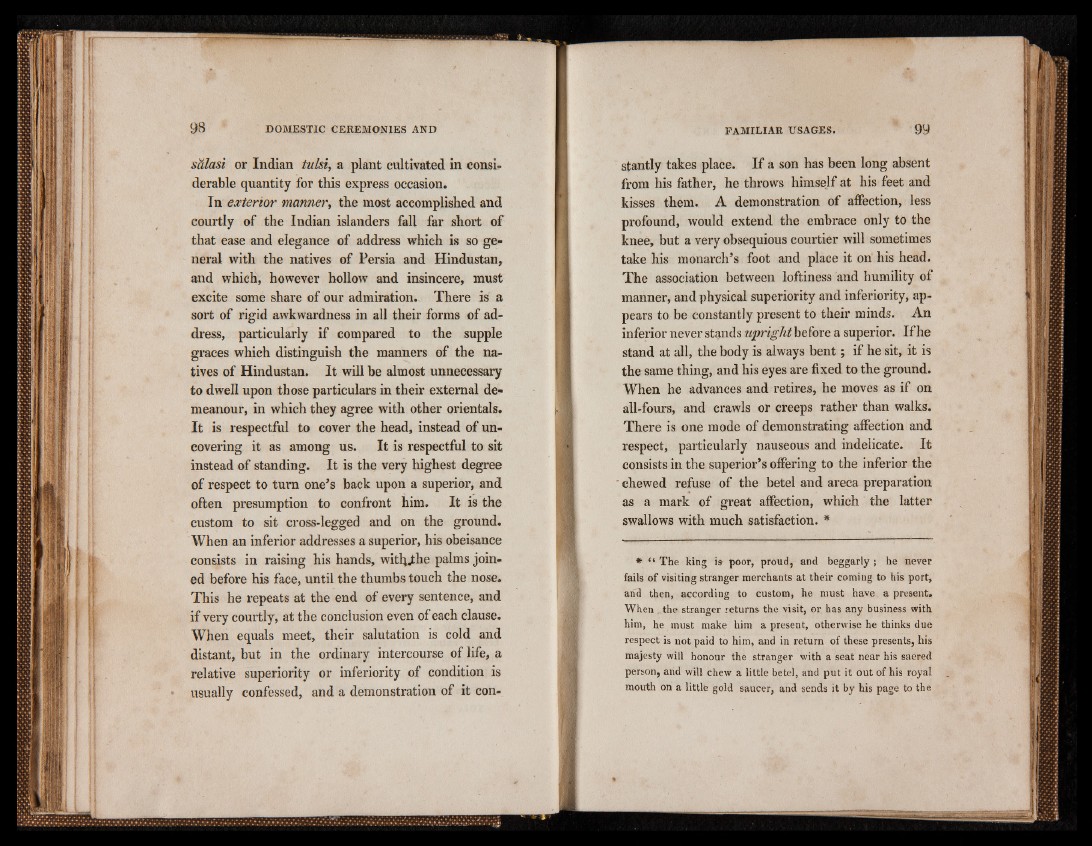
sdlasi or Indian tulsi, a plant cultivated in considerable
quantity for this express occasion.
In exterior manner, the most accomplished and
courtly of the Indian islanders fall far short of
that ease and elegance of address which is so general
with the natives of Persia and Hindustan,
and which, however hollow and insincere, must
excite some share of our admiration. There is a
sort of rigid awkwardness in all their forms of address,
particularly if compared to the supple
graces which distinguish the manners of the natives
of Hindustan. It will be almost unnecessary
to dwell upon those particulars in their external demeanour,
in which they agree with other orientals.
It is respectful to cover the head, instead of uncovering
it as among us. It is respectful to sit
instead of standing. It is the very highest degree
of respect to turn one’s back upon a superior, and
often presumption to confront him. It is the
custom to sit cross-legged and on the ground.
When an inferior addresses a superior, his obeisance
consists in raising his hands, witfyjthe palms joined
before his face, until the thumbs touch the nose.
This he repeats at the end of every sentence, and
if very courtly, at the conclusion even of each clause.
When equals meet, their salutation is cold and
distant, but in the ordinary intercourse of life, a
relative superiority or inferiority of condition is
usually confessed, and a demonstration of it constantly
takes place. If a son has been long absent
from his father, he throws himself at his feet and
kisses them. A demonstration of affection, less
profound, would extend the embrace only to the
knee, but a very obsequious courtier will sometimes
take his monarch’s foot and place it on his head.
The association between loftiness and humility of
manner, and physical superiority and inferiority, appears
to be constantly present to their minds. An
inferior never stands upright before a superior. If he
stand at all, the body is always bent; if he sit, it is
the same thing, and his eyes are fixed to the ground.
When he advances and retires, he moves as if on
all-fours, and crawls or creeps rather than walks.
There is one mode of demonstrating affection and
respect, particularly nauseous and indelicate. It
consists in the superior’s offering to the inferior the
chewed refuse of the betel and areca preparation
as a mark of great affection, which the latter
swallows with much satisfaction. *
* “ The king is poor, proud, and beggarly ; he never
fails of visiting stranger merchants at their coming to his port,
and then, according to custom, he must have a present.
When _the stranger returns the visit, or has any business with
him, he must make him a present, otherwise he thinks due
respect is not paid to him, and in return of these presents, his
majesty will honour the stranger with a seat near his saered
person, and will chew a little betel, and put it out of his royal
mouth on a little gold saucer, and sends it by his page to the